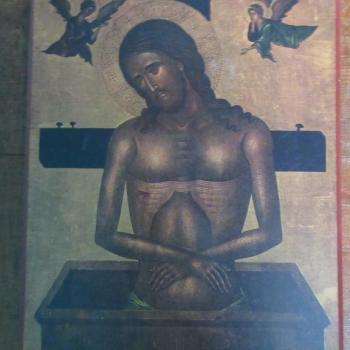“We Must Use Our Eyes!” is the name of one of the chapters in Joseph Ratzinger’s book Christianity and the Crisis of Cultures. This chapter follows his discussion of the right to life and abortion. He starts the chapter by saying:
The moral drama, the decision for good or evil, begins with our eyes, when we choose whether or not to look at the face of the other.”[1]
Emphasis added. This is how he explains why “infanticide is almost unanimously rejected today”[2] while abortion has become widely accepted. It is because we are unable to see the eyes of the baby in the mother’s womb that we are unable to realize the suffering we cause to the little one through abortion.
 Now, I think that it should be a consensus among Catholics that abortion is indeed a murder, a legalized murder, for that matter. We hear about it from the pulpit, Catholic organizations, religious and lay people alike. Therefore, I will not concentrate on the issue of abortion and how by not using our eyes it has become an acceptable form of murder in most Western countries. Rather, I would like to focus on how we use our eyes to recognize our neighbors during our everyday activities.
Now, I think that it should be a consensus among Catholics that abortion is indeed a murder, a legalized murder, for that matter. We hear about it from the pulpit, Catholic organizations, religious and lay people alike. Therefore, I will not concentrate on the issue of abortion and how by not using our eyes it has become an acceptable form of murder in most Western countries. Rather, I would like to focus on how we use our eyes to recognize our neighbors during our everyday activities.
I was stopped at a red light in an intersection when a homeless man held a sign that said: “Burgers and Fries” and had a cross painted on the side. As always, I did not have any cash, so I could not give him anything. Usually, I have $5 gift cards from McDonald’s that I give out to them, but that day I didn’t have any. As he approached my car, I tried to look away so our eyes would not meet. I did not want him to see me. I was embarrassed for him to see the crucifix I have hanging from my rearview mirror. I looked away, because I did not want to realize the pain and necessity he was suffering and I did not want my day to be ruined. Besides, I was having a good time listening to music in my car.
Then I realized that we can be truly evil sometimes. Very deep inside of me, I was upset that this man crossed paths with me showing me his destitution, so that I would see it. How terrible! I just felt like going to confession right after I realized my reaction. I did not want to use my eyes to recognize my neighbor, because by doing so I was being taken out of my comfort zone. I was being challenged. I was asked to give myself. And I chose not to do that. Pope Benedict XVI says what the effect of seeing the other can have on ourselves:
“The face of the other addresses an appeal to my liberty, asking me to welcome him and take care of him, asking me to affirm his value per se, not merely to the extent to which he may happen to coincide with my own interests… When I decide to look him in the face, I am deciding on conversion, I am resolving to let the other address his appeal to me, to go beyond the confines of my own self and to make space for him.“[3]
Emphasis added. Therefore, when we choose to close our eyes or to look away in the face of the other, we are avoiding conversion and because we are in command of our senses, we are deliberately choosing to reject our neighbor, and therefore, deliberately rejecting our Lord Jesus (Mt 25:45). The Compendium of the Social Doctrine of the Church acknowledges the need of conversion of heart for social changes to take place:
“The inner transformation of the human person, in his being progressively conformed to Christ, is the necessary prerequisite for a real transformation of his relationships with others.” [4]
Michael Joseph and I have written extensively on the issue of illegal immigration in this country in our former blog and the response that we have received from the majority of readers who happen to be Catholic have sadly agreed with the inhumane policies of deportation of this administration and the Republican party. I am not an apologist for the Democratic party, of course, because of their faulty anthropology (as well as the Right’s), but we need to ask ourselves… which party is “using their eyes”? Which party is recognizing “their neighbor”? Which party is “deciding on conversion”? Of course, none of them. That is our job as Christians. Political parties do not convert hearts. They do not point the hearts of the faithful and the unfaithful alike to the Risen One. Christians do. And for Christians to achieve this they have to first convert their hearts:
“It is necessary, then, to appeal to the spiritual and moral capacities of the human person and to the permanent need for his inner conversion, so as to obtain social changes that will really serve him. The acknowledged priority of the conversion of heart in no way eliminates but on the contrary imposes the obligation of bringing the appropriate remedies to institutions and living conditions when they are an inducement to sin, so that they conform to the norms of justice and advance the good rather than hinder it.” [5]
The suffering of many illegal immigrants is just one of the many issues that challenge us to open our eyes and to use them. Homelessness, domestic abuse, war, poverty and destitution are just a few of the issues that need our eyes to be open so we can unite in solidarity with those who suffer. We need to be strong enough to look to the right direction. We need to stop being naive and to drop all distractions and worldly things that prevent us from using our eyes. We need to be adults “and put aside childish things.” (1 Cor 13:11)
So, if as Pope Benedict XVI says, our decision to do good or evil “begins with our eyes,” before we say that there is no poverty and destitution in America or before we say that it is better for illegal immigrants to go back to their homes to earn $5 a day, we need to remind ourselves that “we must [first] use our eyes…” always!
__________________________________________________________________________
[1] Ratzinger, Joseph. Christianity and the Crisis of Cultures. trans. Brian McNeil (San Francisco: Ignatius, 2006), 65
[2] Ibid.
[3] Ibid., 66
[4] Compendium of the Social Doctrine of the Church, 42
[5] Catechism of the Catholic Church, 1888












